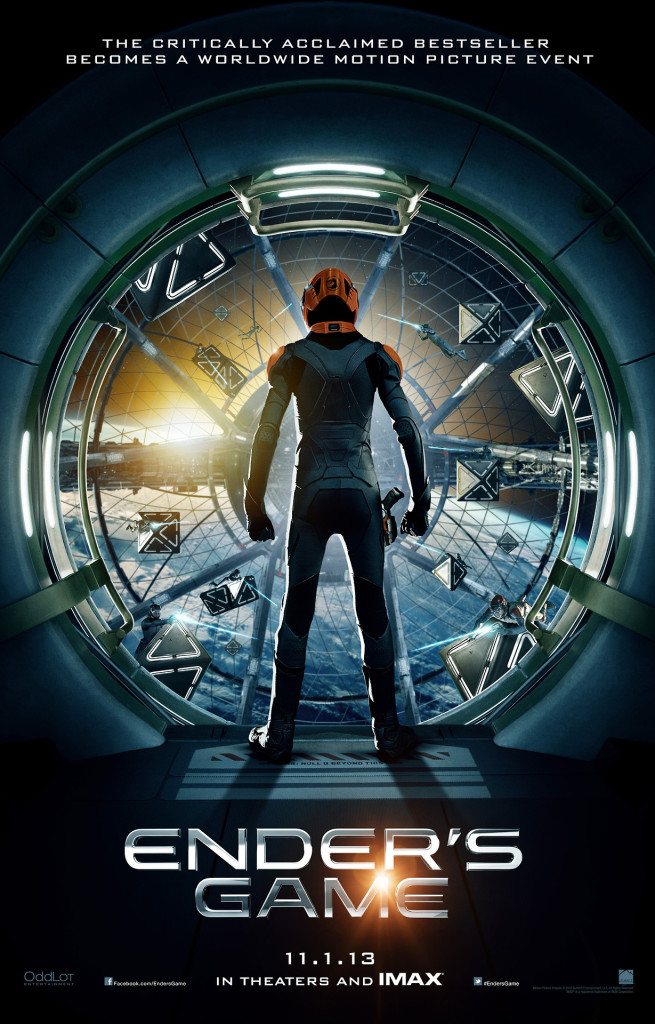WoGF Review: Those Who Hunt the Night by Barbara Hambly
 Carrie Naughton (Bookkeeper) is a book writer who moonlights as a bookkeeper even though she’s mostly a book reader. She likes to eat breakfast for every meal, drives a purple car, and listens to Roger Waters almost exclusively during tax season.
Carrie Naughton (Bookkeeper) is a book writer who moonlights as a bookkeeper even though she’s mostly a book reader. She likes to eat breakfast for every meal, drives a purple car, and listens to Roger Waters almost exclusively during tax season.
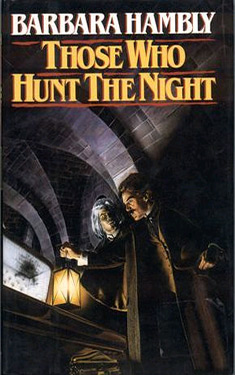 YYEEESSSS! YES! This is what I want to read when I want to read a vampire novel.
YYEEESSSS! YES! This is what I want to read when I want to read a vampire novel.
And get me: I’m addicted to The Vampire Diaries on the CW, I read Anne Rice when I was in high school, and I still consider Stoker’s Dracula to be one of the finest novels ever written (and I can’t stand epistolary novels!). Near Dark kicks Zero Dark Thirty ass in Kathryn Bigelow’s directorial canon, in my opinion, and if you haven’t read Anne Billson’s novel Suckers, you need to immediately. Hopefully this all suffices to establish my street cred as vampire novel evaluator. Notice I’m not mentioning Stephenie whatshername Twilight here. At least, I’m trying not to.
First, Barbara Hambly is a thinking woman’s writer. Because yes, there are nonthinking women out there. I should know, I am a nonthinking woman sometimes. I read the first Sookie Stackhouse novel (cringe) and ditched the books for HBO’s True Blood adaptation so I could salivate over Alexander Skarsgaard. And there’s of course Anita Blake, Vampire Hunter, who is apparently supersexycool (ok, I’m not really sure if she’s that because I haven’t read any Laurell K. Hamilton, but I’m sure I’d prefer Anita Blake over Bella and Edward). There’s now enough vampteen and hip-chick vampire hunter lit out there to make a bookstack that would stretch from here to the Wraith mothership in the Pegasus Galaxy (yes I’m referencing Stargate Atlantis here, and I’m not ashamed). Speaking of the Wraith, what you get with Hambly’s novels is scary vampires. The ones who want you dead because you’re an inferior humanoid food source. The kind of vampires Stoker had in mind.
WoGF Review: The Heritage of Hastur by Marion Zimmer Bradley
 Brett Ellis (Brett72): My interest in reading was spurred by my father reading to me before bed when I was a boy. I developed my reading skills because I wanted to know what happened next and the nightly sessions were too slow. My parents took me to see “Star Wars” when I was five and I’ve been hooked on sci-fi and fantasy ever since. Yes, I am part of that generation for whom “Star Wars” was a life-shaping experience. When not reading far too many “Warhammer” novels, I enjoy miniature wargaming and action flicks.
Brett Ellis (Brett72): My interest in reading was spurred by my father reading to me before bed when I was a boy. I developed my reading skills because I wanted to know what happened next and the nightly sessions were too slow. My parents took me to see “Star Wars” when I was five and I’ve been hooked on sci-fi and fantasy ever since. Yes, I am part of that generation for whom “Star Wars” was a life-shaping experience. When not reading far too many “Warhammer” novels, I enjoy miniature wargaming and action flicks.
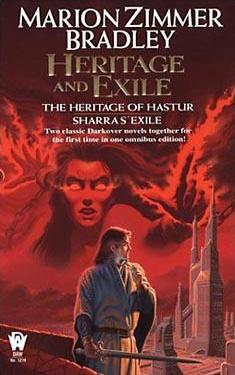 Marion Zimmer Bradley was the first author I chose after signing up for the Women of Genre Fiction challenge here at WWEnd. Anyone who’s been in the Science Fiction/Fantasy section of a bookstore has seen the huge trade paperback of The Mists of Avalon dominating the shelf. I’ve been noticing it for years and fully intended to take the opportunity provided by the WoGF challenge to finally read it.
Marion Zimmer Bradley was the first author I chose after signing up for the Women of Genre Fiction challenge here at WWEnd. Anyone who’s been in the Science Fiction/Fantasy section of a bookstore has seen the huge trade paperback of The Mists of Avalon dominating the shelf. I’ve been noticing it for years and fully intended to take the opportunity provided by the WoGF challenge to finally read it.
And yet….
When I looked at Bradley’s books in the WWEnd database, I noticed a series of books called “Darkover.” These books spanned her whole career of published works! I was intrigued and chose The Heritage of Hastur as my introduction to Darkover and Marion Zimmer Bradley.
What an introduction! This novel was a joy to read. Any trepidation I had about jumping into a long running series midway was soon laid to rest. The Darkover books are meant to be enjoyed as stand-alone novels as well as part of a series. Bradley does a great job of weaving the history and culture of Darkover into the narrative. At no point was I on the receiving end of an information dump or an “Our story so far…” synopsis.
WoGF Review: Ammonite by Nicola Griffith
 Jonathan Thornton (thrak) is a long-time science fiction and fantasy reader, but has only just started writing reviews on his blog Golden Apples of the West. Outside of reading, his interests are music and insects. His new year’s resolution is to review more of the books he has read on WWEnd and maybe finally get round to writing his own SF novel that he’s always talking about.
Jonathan Thornton (thrak) is a long-time science fiction and fantasy reader, but has only just started writing reviews on his blog Golden Apples of the West. Outside of reading, his interests are music and insects. His new year’s resolution is to review more of the books he has read on WWEnd and maybe finally get round to writing his own SF novel that he’s always talking about.
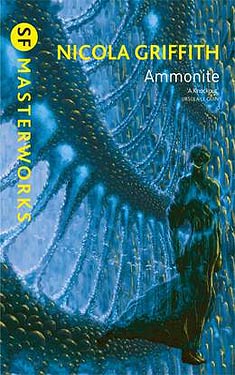 “And these places you go, the people you find, do you come to care for them? Or do you only study them, like strange shells you might find on the beach?”
“And these places you go, the people you find, do you come to care for them? Or do you only study them, like strange shells you might find on the beach?”
Marguerite Angelica Taishan is sent by the Company to visit Grenchstom’s Planet, or GP, pronounced Jeep, for short. The Company, being paternalistic, militaristic and colonial, had tried to take Jeep in the past, but now the planet is in quarantine because during the Company’s previous attempt to colonise it a virus wiped out the entire male population. Nevertheless the completely female population is still flourishing and procreating. Marghe’s job is to test a new vaccine against the virus, and to try to establish a dialogue between the Mirrors, Company’s muscle, and the indigenous population. However, there is a Company warship in orbit ready to sterilise the planet if the vaccine fails, and a woman, Uaithne, from the Echraidhe tribe in the north, is spreading death and destruction through the local population.
WoGF Review: The Handmaid’s Tale by Margaret Atwood
 Nadine Gemeinböck (Linguana) has been reading fantasy for as long as she can remember. She started blogging about books on SFF Book Review in 2012, hoping to keep track of what she read and how she liked it. The book blogging community has since helped her open her literary horizons and thanks to WWEnd, she is currently working her way through NPR’s Top 100. Her blogging resolution is to review more foreign language books and finally take the plunge into a big, swooping space opera.
Nadine Gemeinböck (Linguana) has been reading fantasy for as long as she can remember. She started blogging about books on SFF Book Review in 2012, hoping to keep track of what she read and how she liked it. The book blogging community has since helped her open her literary horizons and thanks to WWEnd, she is currently working her way through NPR’s Top 100. Her blogging resolution is to review more foreign language books and finally take the plunge into a big, swooping space opera.
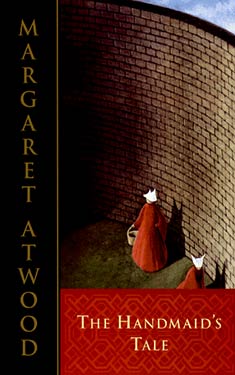 First sentence: We slept in what had once been the gymnasium.
First sentence: We slept in what had once been the gymnasium.
It is the world of the near future, and Offred is a Handmaid in the home of the Commander and his wife. She is allowed out once a day to the food market, she is not permitted to read, and she is hoping the Commander makes her pregnant, because she is only valued if her ovaries are viable. Offred can remember the years before, when she was an independent woman, had a job of her own, a husband and child. But all of that is gone now… everything has changed.
How does one go about reviewing a book that is not only considered one of the best ever written but was published a full year before one’s own birth? I suppose one doesn’t. Then again, what I do here in my little blogeress haven is really only putting my impressions into writing, not fully reviewing books (I believe that’s only possible with spoilers and I avoid them so you guys can enjoy the books I recommend in full). It took me a long time to finally read Margaret Atwood‘s probably most well-known book, The Handmaid’s Tale, and I’m happy to say that, again, the WWEnd Women of Genre Fiction Challenge gave me that last push.
WoGF Review: Frankenstein by Mary Shelley
 Neringa Terleckaite’s (Zoori): My passion for reading comes from my parents. The very first SF book I read was the Desert by Colin Wilson of Spider-world series. Since then I am convinced that spiders are mind-readers, however, all means of communication have failed so far. SF is a way of escapism for me, as well as a celebration of human imagination combined with its universal themes. WoGF is a great encouragement to discover new worlds, and tell others about them.
Neringa Terleckaite’s (Zoori): My passion for reading comes from my parents. The very first SF book I read was the Desert by Colin Wilson of Spider-world series. Since then I am convinced that spiders are mind-readers, however, all means of communication have failed so far. SF is a way of escapism for me, as well as a celebration of human imagination combined with its universal themes. WoGF is a great encouragement to discover new worlds, and tell others about them.
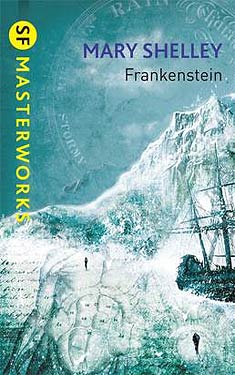 Frankenstein; or, The Modern Prometheus is a novel written by Mary Shelley.
Frankenstein; or, The Modern Prometheus is a novel written by Mary Shelley.
I believe that starting my WoGF readings with Frankenstein by Mary Shelley has been a logical choice in terms of chronology of the genre: this book is considered one of the first modern science fiction novels. It has also been practical, since that was the only unread SF/F woman writer in my personal collection (until I learnt of WoGF). Starting my WoGF reviews with a world’s classic horror story is challenging. Who has not heard of Frankenstein or seen one of its many adaptations in popular culture? The name has become part of the English dictionary meaning “a person who creates something that brings about his ruin” contrary to the common confusion of the name with the actual monster. However, how many actually know it was written by a woman author? Or that it was first published anonymously in 1818?
It is a story of Victor Frankenstein, a young, bright and ambitious scientist, who creates a living being in his laboratory. Only after witnessing the awakening of the monster does he realize the madness and horror behind this act, and escapes his creation only to become haunted by it. Gradually not only his sanity but also his personal life gets ripped to pieces by the consequences of such action, in the end turning into a deadly chase. The question is: who is the actual monster?
WoGF Review: His Majesty’s Dragon by Naomi Novik
 Nathan Barnhart (Skynjay) is one of three reviewers for Fantasy Review Barn. Though he read Anne McCaffrey’s Pern books as a kid, he didn’t really get into the genre until a few years ago, at which point he started reading any speculative fiction he could get his hands on. If not reading or playing with his kid, you can find him at the rec getting beat in basketball.
Nathan Barnhart (Skynjay) is one of three reviewers for Fantasy Review Barn. Though he read Anne McCaffrey’s Pern books as a kid, he didn’t really get into the genre until a few years ago, at which point he started reading any speculative fiction he could get his hands on. If not reading or playing with his kid, you can find him at the rec getting beat in basketball.
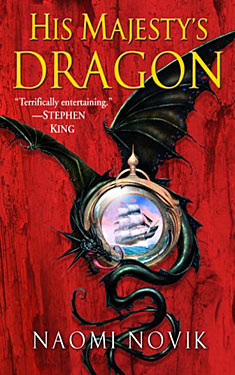 Oh friggen sweet. Ok, so here’s how it is. This stuffy British sea captain wipes the deck with a Frenchie ship (ha, wipes the deck). When they take control of the ship it has this giant egg on it, because it turns out there are dragons. This egg is about to hatch so he makes his crew draw straws on who is going to be its best bud because these crazy people don’t want their very own dragon and it is a punishment or something. But when the egg hatches and the loser kid tries to talk with him the dragon is like, oh hell no I ain’t running with no lackey, where is the big dog on this boat? He finds the captain and talks to him in perfect English saying, you and me man.
Oh friggen sweet. Ok, so here’s how it is. This stuffy British sea captain wipes the deck with a Frenchie ship (ha, wipes the deck). When they take control of the ship it has this giant egg on it, because it turns out there are dragons. This egg is about to hatch so he makes his crew draw straws on who is going to be its best bud because these crazy people don’t want their very own dragon and it is a punishment or something. But when the egg hatches and the loser kid tries to talk with him the dragon is like, oh hell no I ain’t running with no lackey, where is the big dog on this boat? He finds the captain and talks to him in perfect English saying, you and me man.
So Captain Laurence has this dragon, and doesn’t know what to name him, so he calls him Temeraire after some lame ship or something. And the dragon is really smart, but because they are new they have to go off and train on how to be a useful in a fight. Which is awesome, because I totally read all the Pern books and those dragons NEVER fought, they just flew around people and shot falling strings out of the sky. But in this book Europe is at some war between the English and the French, and they totally load the dragons up with gunmen and bombs and attack ships and other dragons with them.
Ender’s Game Movie Poster!
This Ender’s Game poster looks pretty sweet if you ask me. I hope this means we’ll start to see more details and behind the scenes stuff coming out. They’ve been pretty stingy so far on their blog. What do you think?
WoGF Review: Boneshaker by Cherie Priest
 Matt W. (Mattastrophic), is a teacher and a PhD student in Rhetoric and Composition in Kentucky. SF is his literary indulgence, his escape from dissertation writing, and the subject of an occasional conference presentation. His blog, Strange Telemetry, is both his sounding board and his chronicle as he makes his way through the various sub-genres of SF in order to better understand his tastes as a reader and the craft of writing in general.
Matt W. (Mattastrophic), is a teacher and a PhD student in Rhetoric and Composition in Kentucky. SF is his literary indulgence, his escape from dissertation writing, and the subject of an occasional conference presentation. His blog, Strange Telemetry, is both his sounding board and his chronicle as he makes his way through the various sub-genres of SF in order to better understand his tastes as a reader and the craft of writing in general.
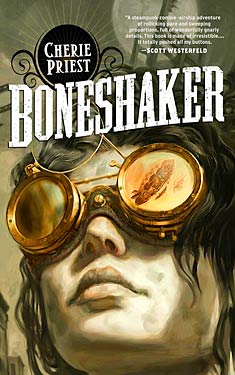 It is the late 19th century. The American Civil War has carried on for over a decade, and the America’s northwestern territories are mostly left to fend for themselves. On a commission from the Russian government, inventor Leviticus Blue creates a mighty machine, the Boneshaker, whose drill was intended to pierce the tough rock and permafrost in the vast oil fields of the Alaskan territories. Before its unveiling, however, Blue’s machine was turned on. The Boneshaker tore through his laboratory and through the underground of a great chunk of Seattle, in what would later become the state of Washington. Buildings collapsed, people and structures fell into massive sinkholes, and a noxious gas that turned people into rotting, cannibalistic monsters was released. Panic ensued, and in the confusion a well-respected lawman, Maynard Wilkes, went into the heart of the blight-gassed streets and released a mass of prisoners, possibly to help him take advantage of the chaos and rob the now-vulnerable banking district. Well, Wilkes died, Blue disappeared, and a great wall went up around downtown Seattle to cordon off the blight-filled streets and the rotters, the living dead, who now dwelt there.
It is the late 19th century. The American Civil War has carried on for over a decade, and the America’s northwestern territories are mostly left to fend for themselves. On a commission from the Russian government, inventor Leviticus Blue creates a mighty machine, the Boneshaker, whose drill was intended to pierce the tough rock and permafrost in the vast oil fields of the Alaskan territories. Before its unveiling, however, Blue’s machine was turned on. The Boneshaker tore through his laboratory and through the underground of a great chunk of Seattle, in what would later become the state of Washington. Buildings collapsed, people and structures fell into massive sinkholes, and a noxious gas that turned people into rotting, cannibalistic monsters was released. Panic ensued, and in the confusion a well-respected lawman, Maynard Wilkes, went into the heart of the blight-gassed streets and released a mass of prisoners, possibly to help him take advantage of the chaos and rob the now-vulnerable banking district. Well, Wilkes died, Blue disappeared, and a great wall went up around downtown Seattle to cordon off the blight-filled streets and the rotters, the living dead, who now dwelt there.
WoGF Review: Kushiel’s Dart by Jacqueline Carey
 Ten years ago Maylin Tan (dihenydd) left the rat race of teaching maths (to naughty boys in the UK) to live in a yurt in rural France. No longer ruled by the alarm clock she can stay in bed and read all day if she wants. Within genre fiction her tastes are eclectic – ranging from YA to erotica. She is a keen knitter and two years ago formed Tri’Coterie with the byline Colouring your Fantasies, dyeing yarns for discerning knitters inspired by genre themes. This has proved so popular it is hard to keep up with demand.
Ten years ago Maylin Tan (dihenydd) left the rat race of teaching maths (to naughty boys in the UK) to live in a yurt in rural France. No longer ruled by the alarm clock she can stay in bed and read all day if she wants. Within genre fiction her tastes are eclectic – ranging from YA to erotica. She is a keen knitter and two years ago formed Tri’Coterie with the byline Colouring your Fantasies, dyeing yarns for discerning knitters inspired by genre themes. This has proved so popular it is hard to keep up with demand.
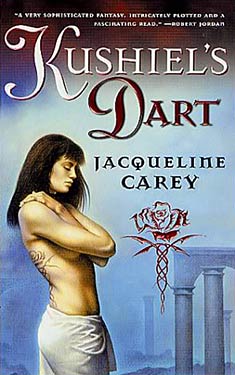 Some of the best world building I have come across lately.
Some of the best world building I have come across lately.
Ms. Carey seems to have gone through world history cherry-picking for interesting cultures, irrespective of contemporaneity, added her own mythology and a full cast of well developed characters. The result is a brilliant melange.
I’ve seen it noted that the language is overly flowery. I listened to the audio book and once I got used to the cadence of the reader the language seemed well suited to the story giving it the atmosphere of Memoirs of a Geisha set in an 11th century Aquitaine Court.
Much has been said about the sexual content of the book, particularly the ‘hardcore BDSM’ content. I found the description laughable. Phedre is, I would hazard a guess, a sexual masochist. This gives her some notoriety and standing in a society whose main precept is ‘Love as thou wilt’ However I think it is more of device to explain her unusual standing than a titillating adjunct. There is no erotic content, the sexual descriptions are relatively clinical rather than arousing. As for ‘hardcore BDSM’ whoever thinks that has obviously never read any of that genre, let alone anything hardcore.
WoGF Review: The Drowning Girl by Caitlín R. Kiernan
 Daniel Roy (Triseult) is a writer, slow traveler, backpack foodie, endurance runner, and SF junkie. He has lived in Canada, China, and India, and currently resides in South Korea.
Daniel Roy (Triseult) is a writer, slow traveler, backpack foodie, endurance runner, and SF junkie. He has lived in Canada, China, and India, and currently resides in South Korea.
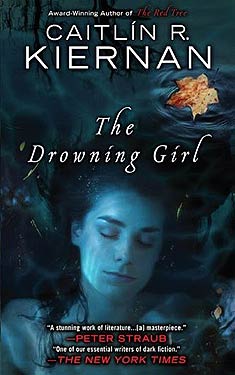 The Drowning Girl is the story of Imp, a woman struggling with schizophrenia who tries to exorcise her encounter, or encounters, with a siren, a ghost, a werewolf, or perhaps none of these things.
The Drowning Girl is the story of Imp, a woman struggling with schizophrenia who tries to exorcise her encounter, or encounters, with a siren, a ghost, a werewolf, or perhaps none of these things.
This synopsis might sound confusing, but it barely scratches the surface of this beautiful confusion of a novel. At times a stream of consciousness narrative, at others a mythological exploration, it often ventures into poetic and mythological flights of fancy, a journey to the heart of a soul in distress.
Imp herself is a magnificent protagonist, at once intelligent and vulnerable, self-aware and trapped in her own mind. One cannot help but feel strongly for her as her life takes a turn for the darker. She is an unreliable narrator through and through, even to herself, and trying to piece together the truth (or should I say, the facts) from her narrative is at once challenging and satisfying. She moves through her ghost story not through links of causality, but through symbols and associations, in the manner of the purest of fairy tales. She skirts around the edges of her pain, sometimes speaking in metaphor, sometimes lying. When the horror creeps into the story, it is that genuine night terror, the feeling of the world dissolving under the power of primordial symbols moving against you in the darkness.



















 Full Details
Full Details
